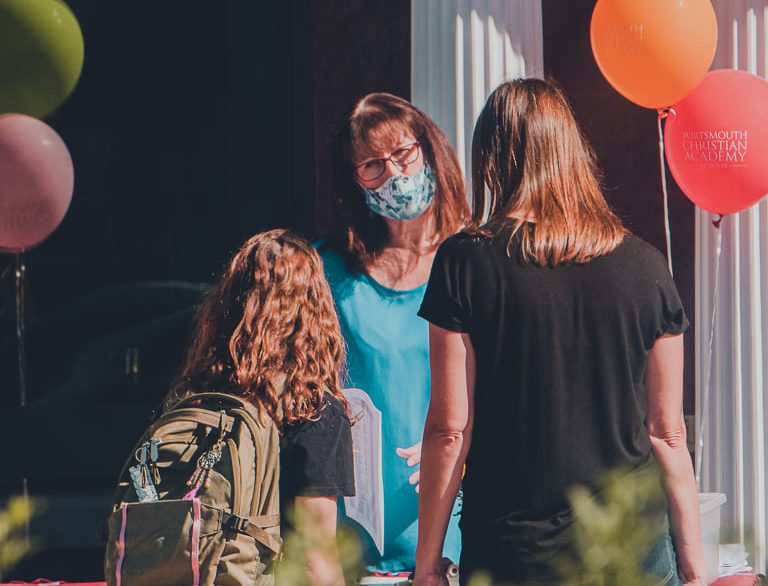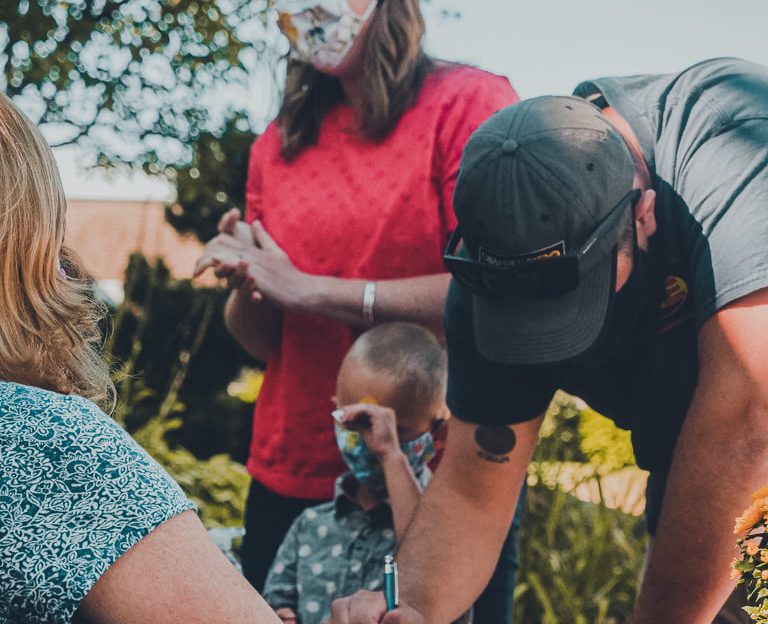Is Anybody There?: Creating Community in the Midst of Social Isolation

By Elaina Russo, October 2020
Someone I know recently said he feels alone on an island these days because he can’t meet up with people the way he used to because of the pandemic. He wasn’t lamenting the loss of a full social calendar before Covid-19 that now is empty. He was talking about the organic connections—bumping into other parents during soccer practice and at our school’s assemblies and special events, the quick connections with teachers in the halls or during school field trips, and running into familiar faces in his town’s bagel shop.
Another parent shared that he feels like his interactions with his kids’ school are all transactional. A woman I know who loves to bake and bless others with her culinary creations feels like she doesn’t know how to bless people these days.
They’re not alone. In fact, you might be reading this and nodding your head in agreement as you consider similar feelings of disconnect. A study back in January by Cigna of 10,000 adults in the U.S. found that 3 out of 5 feel lonely, and that was BEFORE the pandemic. That’s even with social media, e-mail, work, church, and full calendars. Busyness is no substitute for genuine connection.
Some will read this and feel there’s nothing to be done but wait it out. I have a different take. I see it as an affirmation of God’s design for us to live in community with each other, and as a result of that, I see it as a responsibility to not complain about it, but to do something about it. Let’s look at these two ideas of God’s call for community and our responsibility for building and nurturing that community…
Community is God’s Design
People expressing feelings of disconnect are testifying to God’s design for us to be in community with each other. God did not create us to live in isolation, and the call to be in relationship with others satisfies our spiritual, emotional and mental health needs. Here are just a few examples of Scriptural references about being in community with one another:
“Iron sharpens iron, and one man sharpens another.” – Proverbs 27:17
“And let us consider how to stir up one another to love and good works, not neglecting to meet together, as is the habit of some, but encouraging one another, and all the more as you see the Day drawing near.” – Hebrews 10:24-25
“Two are better than one, because they have a good reward for their toil. For if they fall, one will lift up his fellow. But woe to him who is alone when he falls and has not another to lift him up!” – Ecclesiastes 4:9-10
“And all who believed were together and had all things in common. And they were selling their possessions and belongings and distributing the proceeds to all, as any had need. And day by day, attending the temple together and breaking bread in their homes, they received their food with glad and generous hearts…” – Acts 2:44-46
“For where two or three are gathered in my name, there am I among them.” – Matthew 18:20
But There Aren’t Opportunities for Me to Connect with Others
Earlier, I mentioned that we have a responsibility to not complain about lack of connections, but to actually do something about it. Yes, a responsibility…to ourselves, our children, and our community. Depending on where you live, you may not have the same opportunities to spontaneously bump into people and chat for a bit as you used to before Covid-19. Most of the time, most of us wait for our church or school or employer or town rec group to come up with community-building ideas and to extend the invitation to us to join activities.
But belonging and community start with relationships and intentionality. Social media and e-mail only carry a relationship so far. And for those people who get super-charged by being around others and who gain as much by non-verbal cues as by what is actually said, social media and e-mail alone won’t fit the bill. If you’ve read this far, you’re either someone for whom relationships and community are critical or you have a child or spouse or other loved one for whom this is true.
During this time of social isolation and social distancing, we can no longer sit back and wait for community to come to us. We have to be the spark that gets things going…with initiative, outreach, and response. Nowadays, it means we may have to be the ones getting creative, maybe even getting uncomfortable as we step into new roles. It’s not waiting for someone else to start up a group, but be the person who starts up the group, or co-lead the organizing of said group. Take up the charge over these next few months and see if the first half of 2021 is any more satisfying than the second half of 2020.

Where Do We Go From Here?
We’ve got biblical evidence of God’s design for us to be in community with each other. We’ve got our own yearnings for greater connection. We recognize our individual responsibility in building and nurturing community. But what can we do during a pandemic to create or renew our sense of belonging for ourselves and those around us?
I’m glad you asked. While I don’t have the complete answer, I’m starting to explore the possibilities and opportunities below that are outside of my typical go-to activities, beyond phone calls and video-chats. I’d love to hear if this list sparks any new ideas that you might share back with me and with others reading this post.
The following can be conducted using the facilities (mainly parking lots and fields) of your local schools, colleges, community centers, employers, churches, grocery stores, and fitness gyms. This may be easier with organizations that you know are not open right now, but don’t let that be a limiting factor. Be sure to check first with each organization to request permission to use their facilities.
- Tuesday Tailgate: Parents can meet up in the parking lot of their school or local grocer after morning drop off and have a parent-sponsored time of fellowship. You would plan to be socially distanced and masked as appropriate. Chilly? Drizzly? Park your cars so that the rears are facing each other, open your hatchback or SUV trunk and sit on the bed.
- Cars and Coffee: Work colleagues or church members meet up in a fashion similar to the above, but at employer or church campuses.
- Weekly/Monthly Trail Walks: Plan a weekly or monthly trail walk together and get to know each other. (When it snows, this can become a snow hike or snowshoeing event.)
- River Romp: If you’re fortunate to be a part of a school or organization that has river access, plan a time to get out on the river on kayaks and paddle boards (bring your own or ask the organization if they have any to use) and enjoy God’s blessing of your surroundings together.
- Fitness Fun: A weekly (twice-weekly) 60-90-minute workout time on athletic fields or parking lots (socially distanced, etc.).
Many of the above only work when the weather is cooperative, so here are some ideas for indoor community-building events (capacity likely limited…ensure social distancing and masks):
- Homeroom Happening: For parents of school-age children, use your school’s directory to invite other parents in your child’s homeroom to a weekly online meet-up. Use this gathering to get to know the other families in our child’s homeroom, and when your state can once again go back to unlimited social gathering, you’ll already have a group of families you know. Have a really small homeroom or your school isn’t broken up by homerooms?…open it up to the whole grade. Need a little structure to get started?…ask the group to come prepared to answer one question each week (What brought you to ABC school? What’s one thing you want for your child this year? How does your family manage dinnertime and homework? Etc.).
- Monday Movies: ask your school or employer or church if you can show movies in one of their larger common spaces. Try to show movies that encourage community and conversation (The Social Dilemma, The Great Hack, Billy: The Early Years, Facing the Giants, Hacksaw Ridge, etc.).
- Book Buzz: your basic book club
- Prayer Group: weekly meeting of individuals committed to praying for specific community
- Topic-Specific Group: a monthly meeting of folks who share a specific interest…motorcycles, cake decorating, martial arts films, birding, tech tools, dog training, etc.
Areas you might consider asking to meet up, depending on the organization:
- Gymnasium
- Cafeteria
- Board Room
- Recreation Hall
- Conference Room
- Athletic Fields
- Nature Trails
- Parking Lots
- Picnic tables
- Library
- Seminar Room
And, of course, it’s worth pointing out that you might not need to reinvent the wheel when it comes to community-building and getting to know the people around you. Check with your school, employer, church or community group to see what opportunities they already have to be in community with others. Our school has in place two prayer groups for moms and one for dads, a weekly group of parents who work on maintenance and freshening projects around the school, homeroom-specific assisting, spectators at athletic games, and a myriad of opportunities through the volunteer center.
Whatever you choose to start and however you choose to be a part of a community, I pray that you will take the next step. And I pray that the months ahead will yield fresh and renewed relationships as you follow God’s design for community and as you take responsibility for your part in building or nurturing community. I’d love to hear from you about how you took the concept of community and built on it. Write to me directly at erusso@pcaschool.org.
Elaina Russo is a parent at Portsmouth Christian Academy (PCA) and serves as PCA’s Variable Tuition Director.
Want to stay up-to-date with what is happening in the PCA community? The PCA Community Facebook group is a hub for PCA families to share, encourage, and ask questions. PCA families are welcome to join!
If your child is not currently enrolled at PCA, but you’d like to see what’s happening at our school, follow us on Facebook and Instagram to get an inside look at our community!


